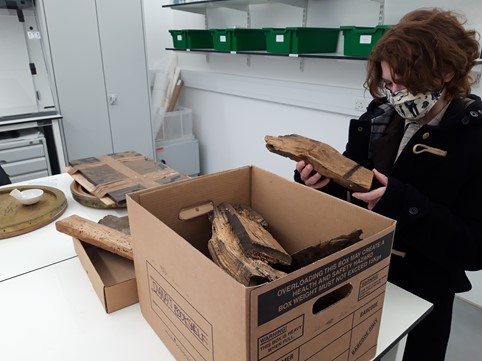From Bioscience to a Forensic Investigation MSc
27/05/2021

When I submitted an application to the Forensic Investigation course at Cranfield during a rare break from writing my PhD thesis last summer, I could never have anticipated that I’d find myself carrying out a research project on one of the most iconic ships in British history. However, that is precisely what I am now doing, researching the activity of wood-decaying fungi on board HMS Victory and investigating the use of nanoparticles as potential antifungal agents.
Having a long-standing interest in naval and maritime history, an undergraduate degree in molecular and cellular biochemistry, and hopes of working in art or heritage conservation, this project feels like an exceptionally fortunate stroke of luck. However, since starting to study at Cranfield, I have come to realise that it’s a natural consequence of the diversity of expertise, backgrounds, and connections represented among the course faculty.
Studying a forensics masters might seem a roundabout route to get into the field of art or heritage conservation, so let me give some background. Although I already had a bachelors/masters and was nearing the completion of my PhD when I applied to Cranfield, all my previous research had been in very unapplied branches of bioscience, far removed from my primary passions of art and history. I therefore wanted a course that would allow me to branch into fields more closely related to my interests.

Solely on the recommendation of a museum conservator, I applied to study at Cranfield, having honestly carried out almost no a priori research into the masters course. This might be the reason it was a surprise to find such a wealth of experience and expertise among the course lecturers, including both faculty and guest speakers, as well as several elective modules perfectly suited to my interests. Those covering Fakes and Forgeries and International Heritage Crime have been, unsurprisingly, high points of the taught course for me, both introducing areas of the art world about which I had almost no previous awareness, and broadening my ideas of potential future career paths.
Mentioning the pandemic is probably requisite for any recollection of experiences over the past year. Due to the various lockdowns and restrictions, most of the course had to be run online. There was considerable potential for this to go wrong, particularly for modules that rely on hands-on activities. However, aside from the almost obligatory sporadic losses of internet connection, accidental muting’s, and troubles with screen sharing, online lectures and even practical’s have run remarkably smoothly. In some modules, interesting workarounds were implemented for practical work, including home delivery of a sort of ‘crime scene in a box’ for Trace Evidence, and a PowerPoint-based virtual crime scene for Hazardous Forensics.
Despite the effectiveness of running much of the course online, I’m relieved that things are now such that the research projects are able to proceed more-or-less hands-on, not least because this has given me the opportunity to visit HMS Victory herself and to meet with conservators working at Portsmouth Historic Dockyard to discuss the project. This is not only extremely valuable from the perspective of my research, but is more importantly an absolute delight to talk with people working in a field I’m fascinated by and keen to be a part of.
To discover more about the Forensic Investigation MSc click here.
Categories & Tags:
Leave a comment on this post:
You might also like…
From classroom to cockpit: What’s next after Cranfield
The Air Transport Management MSc isn’t just about learning theory — it’s about preparing for a career in the aviation industry. Adit shares his dream job, insights from classmates, and advice for prospective students. ...
Setting up a shared group folder in a reference manager
Many of our students are now busy working on their group projects. One easy way to share references amongst a group is to set up group folders in a reference manager like Mendeley or Zotero. ...
Company codes – CUSIP, SEDOL, ISIN…. What do they mean and how can you use them in our Library resources?
As you use our many finance resources, you will probably notice unique company identifiers which may be codes or symbols. It is worth spending some time getting to know what these are and which resources ...
Supporting careers in defence through specialist education
As a materials engineer by background, I have always been drawn to fields where technical expertise directly shapes real‑world outcomes. Few sectors exemplify this better than defence. Engineering careers in defence sit at the ...
What being a woman in STEM means to me
STEM is both a way of thinking and a practical toolkit. It sharpens reasoning and equips us to turn ideas into solutions with measurable impact. For me, STEM has never been only about acquiring ...
A woman’s experience in environmental science within defence
When I stepped into the gates of the Defence Academy it was the 30th September 2019. I did not know at the time that this would be the beginning of a long journey as ...






